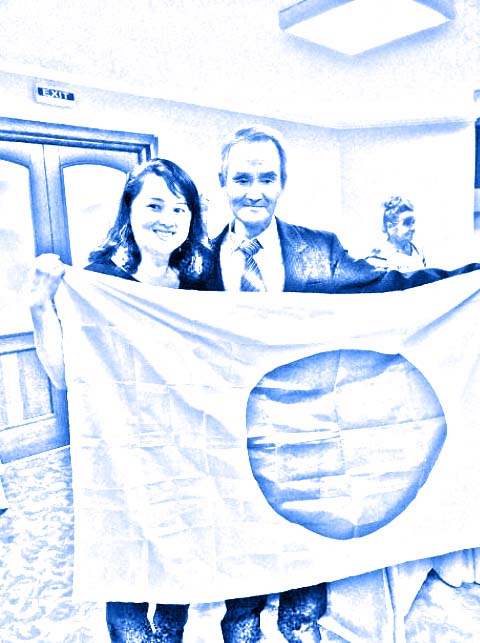‘I am Japanese’ says Sakhalin-born deaf man longing to visit country of his roots

Nikolai Hiranuma, right, holds up a Japanese flag with Misuzu Takanami, in September 2018 on Sakhalin, Russia. (Photo courtesy of Misuzu Takanami). Sketched by the Pan Pacific Agency.
TOKYO, Jun 11, 2019, The Mainichi. Nikolai Hiranuma, born on Sakhalin in 1944 when the southern half of the north Pacific island was under Japanese sovereignty, has never been to the country he considers home. “I am Japanese,” he says, but his family remained on Sakhalin after the Soviet takeover of the entire island in 1945, and he is a Russian citizen, reported The Mainichi.
He is also deaf, and this has apparently led him to miss out on information about arranged visits to Japan for those left behind and chances to firmly establish his roots. His supporters say he has been “history’s plaything,” but they are now working to make the 74-year-old’s dream of a trip to Japan a reality with a guided cross-country tour.
Hiranuma was born on what was then called Karafuto Island, in the town of Naihoro, now Gornozavodsk. He has said that his father passed away when Hiranuma was very young, and he does not remember him. His mother later married a man from the Korean Peninsula, but she died in 1957. After that, Hiranuma lived with his stepfather and three younger sisters. He is now married to a Russian woman, and lives in the town of Korsakov, Odomari in Japanese.
Misuzu Takanami, the 47-year-old director of Uptain, a Tokyo-based nonprofit organization involved in promoting the adoption of international sign language, came across Hiranuma’s story last year. In March 2018, she voyaged to Sakhalin to try to track him down, and there discovered that many more people from Japan and the Korean Peninsula never made it back to their home countries after World War II.
Takanami asked a Russian acquaintance to help with the search, and they turned up a number of people claiming to be Japanese in the local hard of hearing community. They also determined that Hiranuma was the last of that group still alive. Takanami finally met Hiranuma last September, on a return trip to the Russian island.
According to Takanami, Hiranuma could not read, write or use sign language until he was 12 or 13 years old, when he entered a school for the hard of hearing. Locked in this “world without words,” he could not even understand what his family members were saying, and did not learn anything about his roots from his mother.
He apparently did not even know his surname was “Hiranuma” until he saw it written down somewhere. The 74-year-old says that his Japanese given name is Eishin, but the evidence that either of these are his actual names is uncertain. Supporters from both Japan and Russia have met with him several times to establish the details of his case, but Hiranuma is beginning to show symptoms of dementia, and it has become difficult for him to relate the relevant facts. Birth certificate archives are not as reliable on Sakhalin as in Japan, and there are no extant photographs or public documents to prove who Hiranuma’s real parents were.
When Sakhalin was controlled by Japan, the “Hiranuma” surname was used by both Japanese and Korean residents. In other words, having that family name does not guarantee that the person is Japanese.
However, “I’m sure that, despite not being able to officially confirm his roots, the fact that he is Japanese buoyed him over the years,” commented Hiromi Saito, head of The Japan-Sakhalin Association, a nonprofit organization dedicated to facilitating visits to Japan by Japanese people left on the island after World War II.
Hiranuma obtained a passport in May this year, and was apparently overjoyed.
“Now I can go to Japan!” he was quoted as saying.
(Japanese original by Sooryeon Kim, Lifestyle and Medical News Department)